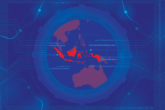Global Swing States
Today, global politics are more contested, more confrontational, and more uncertain than in the past. China seeks domination in the Indo-Pacific and beyond, while Russia remains aggressively revisionist in Europe. Both are working with Iran and North Korea in an “axis of upheaval” to resist a Western-dominated world. Competition between the United States and its allies on the one hand, and a revisionist axis of upheaval on the other, will largely become a contest over the shape of the international order.
Policymakers should focus on six global swing states—Brazil, India, Indonesia, Saudi Arabia, South Africa, and Türkiye—that together will exert disproportionate influence over the future of this order. Each of the six is multi-aligned, maintaining simultaneous ties with the United States, Russia, and China. None wishes to be forced into a strategic alignment with one great power alone, and all seek meaningful changes in international rules and institutions. Each of the global swing states plays a dominant role in its region and takes actions with worldwide repercussions. They possess sufficient collective geopolitical weight for their policy preferences to sway the future direction of the international order.
This area of research offers a path for engaging with global swing states toward a vision of world order favorable to U.S. interests. International competition today is far more acute than 13 years ago, the shape of international order much more contested, the U.S. role more uncertain, the stakes even higher, and, as a result, the potential role of global swing states in the outcome even greater.
Read More

Global Swing States and the New Great Power Competition
International politics is undergoing a period of rapid, significant change. China and Russia are working together more closely and alongside Iran and North Korea...
Read MoreCountering the Digital Silk Road: Saudi Arabia
Project Overview The year 2025 marks the 10th anniversary of the Digital Silk Road (DSR), China’s ambitious initiative to shape critical digital infrastructure around the worl...
Countering the Digital Silk Road: Kenya
Researchers from the CNAS Technology and National Security team spent a week in the country interviewing U.S. and Kenyan policymakers, journalists, technology firms, civil soc...
Countering the Digital Silk Road: Brazil
Project Overview This year marks the 10th anniversary of the Digital Silk Road (DSR), China’s ambitious initiative to shape critical digital infrastructure around the world to...
Countering the Digital Silk Road: Indonesia
This year marks the 10th anniversary of the Digital Silk Road (DSR), China’s ambitious initiative to shape critical digital infrastructure around the world to advance its geop...
Highlights
-
Global Swing States and the New Great Power Competition
International politics is undergoing a period of rapid, significant change. China and Russia are working together more closely and alongside Iran and North Korea...
By Richard Fontaine & Gibbs McKinley
-
Countering the Digital Silk Road: Brazil
Project Overview This year marks the 10th anniversary of the Digital Silk Road (DSR), China’s ambitious initiative to shape critical digital infrastructure around the world to...
By Ruby Scanlon & Bill Drexel
-
Countering the Digital Silk Road: Indonesia
This year marks the 10th anniversary of the Digital Silk Road (DSR), China’s ambitious initiative to shape critical digital infrastructure around the world to advance its geop...
By Vivek Chilukuri & Ruby Scanlon













